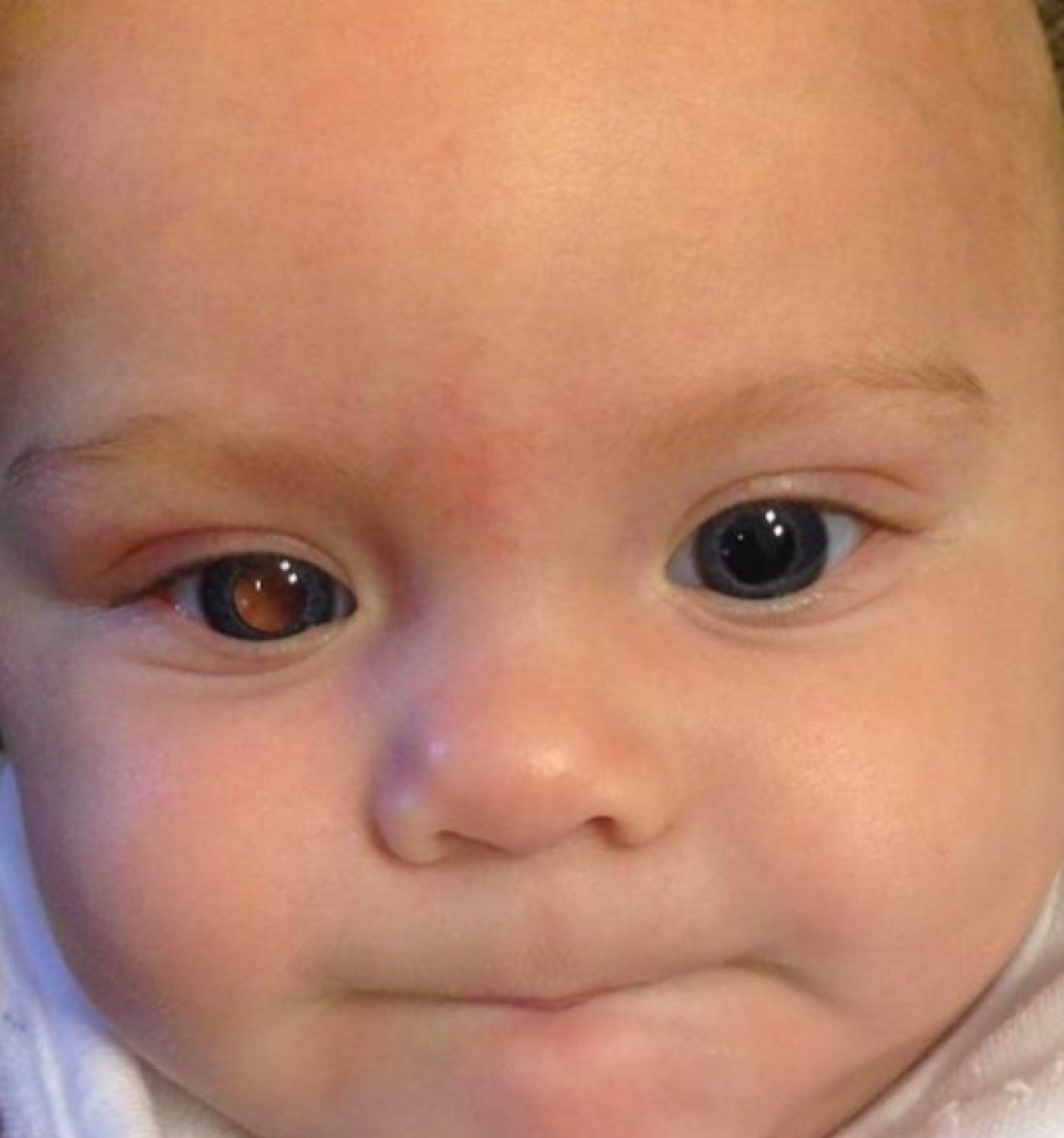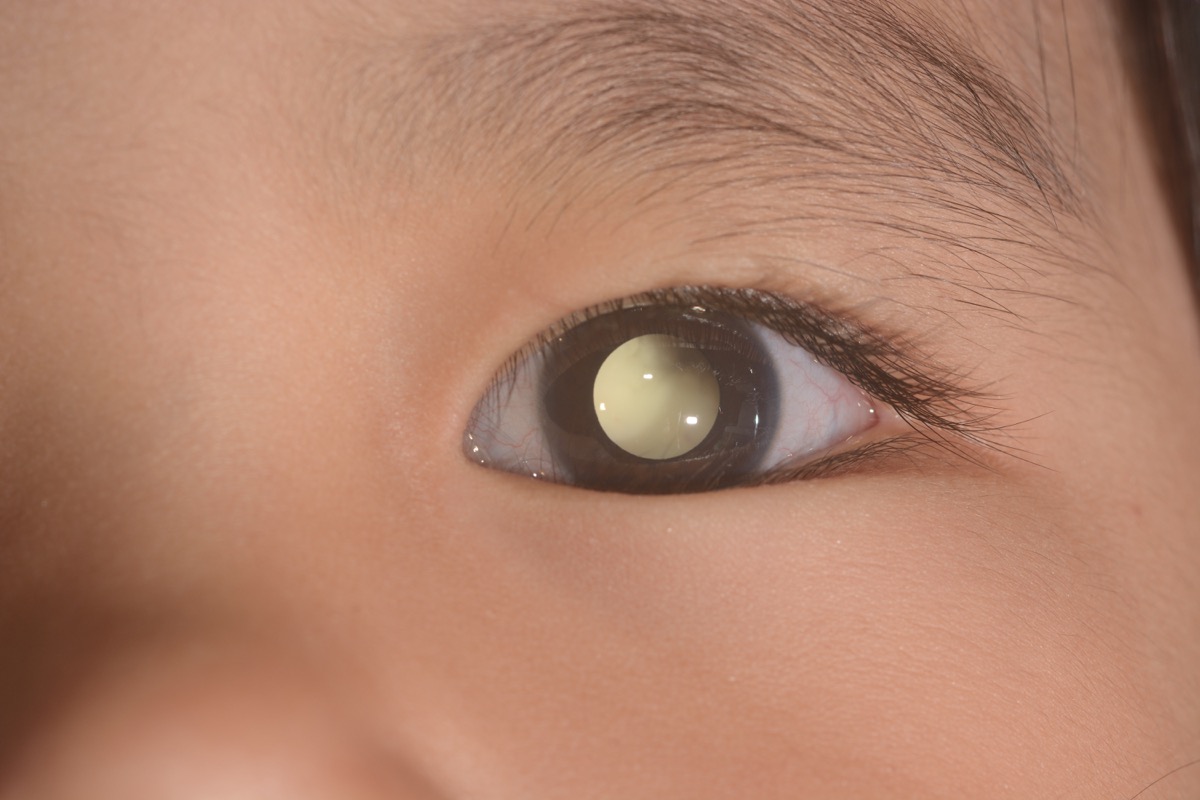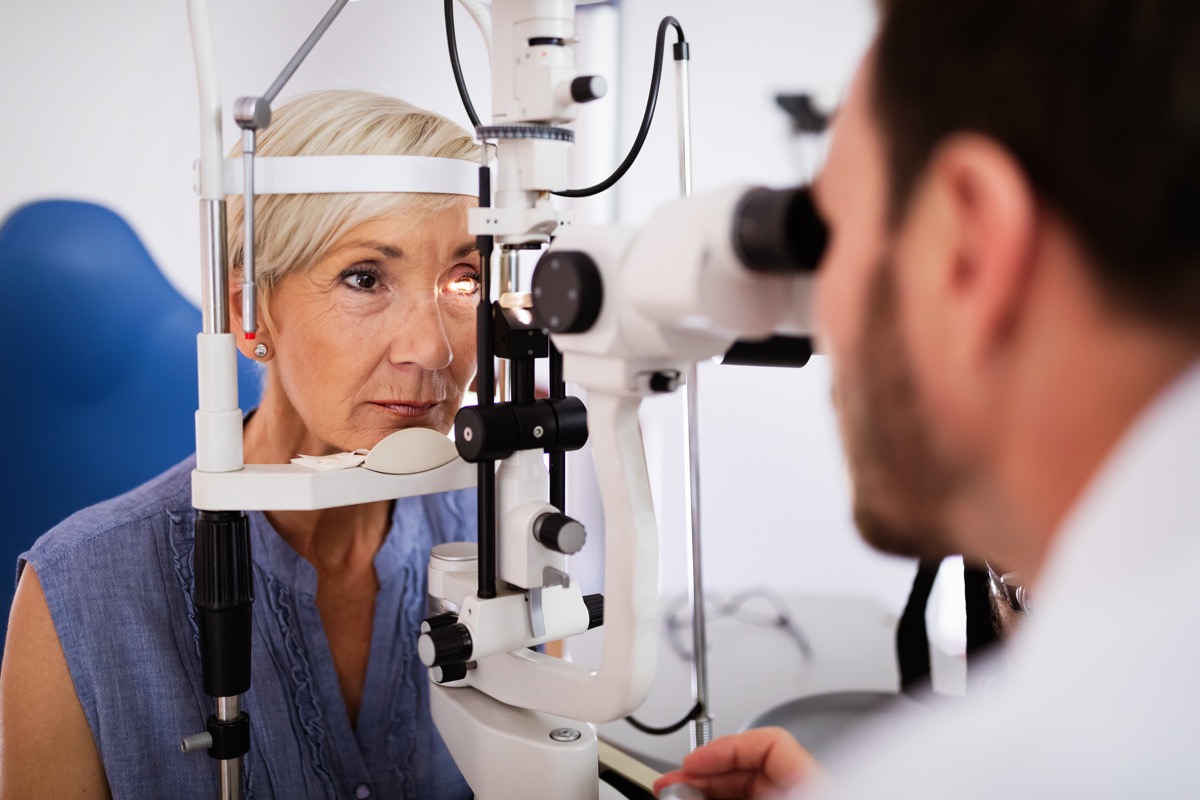If Your Eyes Look Like This in Photos, Call Your Doctor, Experts Warn
What you may think is just the flash could actually be a sign of something serious.

Noticing early signs of certain illnesses can help increase your chances of overcoming them and perhaps even surviving. But the symptoms of some conditions are easy to miss or ignore, and when it comes to our eyes in particular, we often tend to look the other way. Maybe that means denying the presence of floaters at the eye doctor or chalking up blurry vision to fatigue or outdated glasses, but the truth is, your eyes can tell you a lot about your well-being. In fact, there's one strange eye symptom that can show up when you take a photo, and it could be a sign of something very serious. To see what you should look for the next time you take a picture of yourself or your loved one, read on.
RELATED: If You Notice This With Your Eyes, Get Your Thyroid Checked, Doctors Say.
A glow in the eye that shows up in flash photos can be a sign of a serious eye problem, including cancer.
View this post on Instagram
On July 13, Josie Rock told Fox News about the way she discovered her son's cancer. Rock was taking photos of her then-three-month-old son, Asher, and noticed that one of his eyes was glowing white in the center. "I was just taking pictures of him, and the lighting happened to change in our room, the flash caught the reflection, and his eye was glowing white," Rock told Fox News.
As a labor and delivery nurse, Rock recalled learning about retinoblastoma, which is a kind of eye cancer. Fox reports that tumors in the eye can be detected in photo flashes as white in cases where the tumor eclipses what would generally be the reflection in the retina that causes red-eye in photos.
"I knew right then and there that Asher had cancer. It was chilling, to say the least. He was just a baby," Rock said.
Asher is now 7 and doing fine, but Rock continues to share photos to spread awareness to other parents, as retinoblastoma is most common in young children, though still rare. According to St. Jude Children's Research Hospital, retinoblastoma affects about 250 to 300 children in the United States annually.
RELATED: If You Have This Issue With Your Eyes, Your Heart Disease Risk Is High.
If you see the glow in photos more than once, you should get it checked out.

The glow is easy to miss when you assume it's just a glare from the flash. However, once you know what you're looking for, it will be easy to detect. The organization Know the Glow describes the symptom, medically known leukocoria, as "a white, opaque, or yellow spot in the pupil of one or both eyes."
They advise that if you see the glow once, you should be alert. But, they add, "if you see it twice in the same eye, be active." Ophthalmologist Carl May, MD, told NBC affiliate WGAL News 8 that "it really shows up in photographs," so take more pictures if you think you noticed it in one photo.
World Eye Cancer Hope notes that while the white pupil can appear in adult's eyes as well as in children, less than 1 percent of retinoblastoma cases are among adults. "If you have seen white pupil in your own photograph, check whether the reflex appears in other photographs. If it does not and your vision is normal, the white pupil is likely a normal optic disc reflex. A simple eye exam will give you peace of mind that all is well," the experts advise.
The glow could be a sign of more than 20 eye issues.

In the case of Asher Rock, the glow was a sign of cancer. However, it could be an indicator of at least 20 different eye diseases, according to Know the Glow, including a parasitic eye infection, eye trauma, retinal detachment, being cross-eyed, or a cataract.
Jane Edmond, MD, of Baylor College of Medicine and Texas Children's Hospital, pointed out to the American Academy of Ophthalmology (AAO) that there are three conditions that are helpful to determining if you or your loved has a concerning glow in the eye: they're looking directly at the camera, the flash is on and the background is dark, and the red-eye reduction is turned off. If you suspect a glow in your or your loved one's eye, Edmond recommends that you bring the photo to the doctor or ophthalmologist.
For more health news delivered straight to your inbox, sign up for our daily newsletter.
Early detection of eye issues is essential.

Catching the glow early is crucial in terms of the health of your or your child's eyes. For example, "when caught and treated early, retinoblastoma is curable 95 percent of the time," the AAO reports. But these ocular issues often go undiagnosed because there are so few symptoms, which makes looking for the glow imperative.
Gisele Fetterman noticed it in her daughter's eye in photos and it turned out to be Coats' disease, which often comes with a yellowish reflex instead of a white one. According to Healthline, Coats' disease is a rare disorder that causes abnormal blood vessel development in the retina. The AAO says it occurs mostly in boys under 10—though that obviously wasn't true in Fetterman's case—and tends to affect only one eye.
In Feb. 2020, Fetterman told Today that "the doctors were all really impressed that I was able to catch it." She added that "a lot of these cases are preventable, but aren't caught."
RELATED: If You Notice This With Your Eyes, It May Be an Early Sign of Diabetes, Experts Say.





















